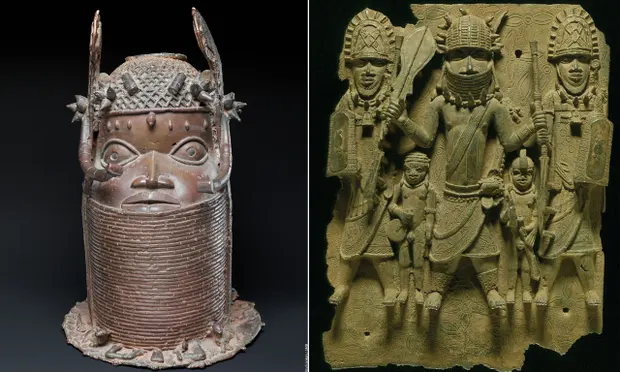Germany is physically returning two Benin bronzes and more than 1,000 other artefacts from its museum collections to Nigeria, more than a century after being looted by British soldiers from the once-powerful kingdom in west Africa,
The German foreign minister, Annalena Baerbock, and the culture minister, Claudia Roth, will sign a restitution agreement with their Nigerian counterparts, Zubairu Dada and Lai Mohammed, in Berlin on Friday afternoon.
With immediate effect, the political agreement transfers 1,100 artefacts held by the Linden Museum in Stuttgart, the Humboldt Forum in Berlin, the Rautenstrauch-Joest Museum in Cologne, the Museum of World Cultures in Hamburg, and the State Ethnographic Collections of Saxony to Nigeria.
The physical return of the individual items would then be negotiated between the museums and the Nigerian government; some of the items may still be on exhibit in Germany under custodial agreements.
Hermann Parzinger, the president of the Prussian Cultural Heritage Foundation, an organisation in charge of managing several of Berlin’s museums, stated that the return “marks a milestone in the process of reappraising colonial injustice in the realm of museum collections.” “We are making a huge step by fully surrendering ownership of all our Benin antiques to Nigeria.”
He said a “representative collection of objects” would remain in the German capital on a long-term loan.
Two Benin bronzes, an expressive 16th-century relief showing an oba with guards or companions, and an 18th-century head of an oba, or monarch, dressed in ceremonial clothing, were to be presented to the Nigerian government on Friday afternoon and returned to west Africa with the group.
At the beginning of the 20th century, the bronzes, which had been stolen by British troops and sailors during a punitive expedition to Benin City in 1897, were auctioned off to museums in Europe and North America, with Germany acquiring the second-largest collection in the world.
The two bronzes that were shown in Berlin on Friday were purchased from the British by Eduard Schmidt, a German ambassador and employee of the Woermann Linie shipping firm, who later sold them to a Berlin museum. They were chosen as examples of the usual style of the artefacts.
On the initiative of the universities that owned them, two Benin bronzes have already been brought back to Nigeria from Britain: an Oba head from Aberdeen University and a cockerel sculpture from Jesus College, Cambridge.
The British Museum, which is home to the biggest collection of Benin bronzes in the world with 900 pieces, has refused to part with any of them, claiming that the British Museum Act of 1963 and the Heritage Act of 1983 prohibit it from ever taking anything back.











